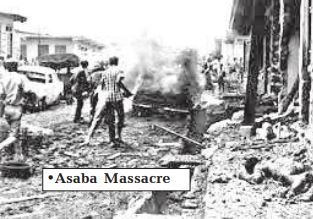By Afamefuna Nwanba jr.
Some of the most emotional scenes in the world today are sights of displaced people either through natural disasters, conflicts, wars, migration and terrorist activities. These factors besides natural disasters like earthquakes, tornadoes, tsunamis, floods etc. are often caused by human actions and inactions. Displacement of people usually upturns their geographic and other physical stabilizing factors like identity, language and socio-economic fortunes.
Read Also: Why North can’t blame Tinubu for marginalization — Gov Sani
The hierarchy of family units from nuclear to extended, to communities, kindreds, clans and villages to larger state-created units like local governments, regions, states and countries are all intrinsically linked for natural order and community. It is therefore reason enough for people to identify with units of relationships at all levels. The progress of human communities across the world is often based on identifications of historical relationships from units that make up identifiable human homogeneity.
There are reasons the occupants of various continents are geographically located at certain parts of the world. There are reasons for similar linguistic, physical, cultural and social affinities amongst people. That is the beauty of diversity. This is what the human communities across continents have in common and these often drive humanity to joy, prosperity, empathy and compassion.
In Nigeria, obviously a product of colonial political economy, the idea of identifying three major tribes; Igbos, Hausas and Yorubas was possibly due to myopic economic value based on population figures. In real terms, there are more than two hundred other ethnicities and more than five hundred languages in between. The colonial super structure left in its wake a legacy of tribal politics that sparked conflicts that robbed the people of the joy of independence.
Fast forward to 2025, the agitation for extra states has gone very high. The history of state creation post-independence is often traced to Gen Yakubu Gowon (Rtd.) whose administration whittled down regional governments for political regional splits into smaller state units. It was a well calculated political strategy to isolate the then Eastern region that stretched as far as into the parts of what has now metamorphosed into Benue, Kogi, Rivers, Cross River and five other states in the region. Subsequent administrations especially of the military had created 36 states in the country and today there are agitations for more either for economic or political reasons.
However, the agitation for Anioma state predates the present clamour for more states. The likes of late Dennis Osadebe, the then Premier of the Mid-Western Region was one of the strong voices that wanted a reunification of Anioma citizens across what is now Delta, Rivers, and other neighbouring states. Many citizens have in the last 60 years towed the same line. The late Prof. Okonjo-Iwela, Prof. Chike edozien, Ralph Uwechue, who at some point was the President General of Ohaneze Ndigbo made their voices heard.
In the tenth Assmbly, Senator Ned Nwoko, representing Delta North Senatorial district, has been at the forefront of advocating for the creation of Anioma state. His Senate Bill to that effect has passed second reading and he is hopeful that with the support of his colleagues in the National Assembly the Bill will be passed and he trusts that President Bola Tinubu would be the democrat he is by granting the wish of the people.
The Senator believes that the agitation is beyond politics. It goes to the root of ancestral homogeneity of the people of the Anioma area consisting of many local governments. The fact that the civil war and its impact on the region affected the socio-cultural identity of the people should not be perpetuated by isolating a group of people who want to identify with their ancestral roots as Ndigbo.
The South East region is the only region with just five states when a region like the North West has seven states while other regions have six states each. Politically, socially and economically, this very fact contributes to the sense of marginalization generations of Ndigbo are forced to feel. Ndigbo everywhere are Ndigbo and as such the creation of Anioma state would just reunite Igbos everywhere around the neighbouring states especially those forced during the Nigerian Civil war into denying their heritage just for survival reasons. This sadly persists today as there are even prominent citizens having identity crises even when their names and culture say otherwise.
There is no better reorientation and rehabilitation of Ndigbo than the creation of Anioma state. The creation of an Anioma state must be seen for the generational socio-economic impact, national cohesion/security,the justice and fairness that would mean for Ndigbo.
The Anioma state creation would be a valid example of physical pursuit of justice and peace in the long term. The young people are following and reading history and no action equates the sense of injustice and inclusion than being treated less than your compatriots elsewhere in the same national jurisdiction. Ndigbo must have their 6th state through Anioma rather than a split of any of the existing states. The people would be reunited with their kits and kin as Igbo people with common heritage, language, culture and history. The Asaba Massacre for instance cannot be undone but restitutions can be made as a soothing balm for generations.
The post Anioma: When ancestry trumps politics appeared first on Vanguard News.

